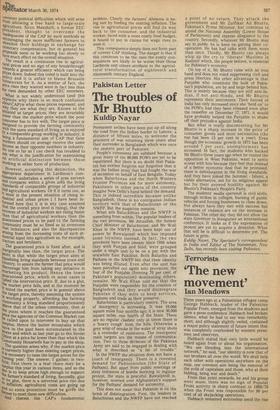Pakistan Letter
The troubles of Mr Bhutto
Kuldip Nayar
Permanent arches have been put up all along the road from the Indian border to Lahore, a distance of fifteen miles, to welcome the prisoners of war returning three years after their surrender in Bangladesh which was once the eastern part of Pakistan.
People's comments are subdued because a great many of the 90,000 POWs are yet to be repatriated. But there is no doubt that Pakistan has neither forgiven nor forgotten that it was the Indian army that had fought the war of secession on behalf of East Bengalis. Today when Baluchistan and the North Western Frontier Provinces ask for more autonomy, Pakistanis in other parts of the country imagine New Delhi's hand behind the demand. This is indeed incredible because unlike Bangladesh, there is no contiguous Indian territory with that of Baluchistan or the NWFP. But the suspicion remains. What ails Baluchittan and the NWFP is something from within. The popular leaders of the two provinces, Mr Attaullah, the former Chief Minister of Baluchistan, and Mr Wali Khan in the NWFP, have been kept out of power by Rawalpindi which has imposed some loyalists instead. In fact, the two provinces have been uneasy since 1956 when they with Punjab and Sind, were grouped under a single unit to be on a par with the erstwhile East Pakistan. Both Baluchis and Pathans in the NWFP felt that their identity was being diluted. Even after the unit has been parcelled out again into provinces, the fear of the Punjabis (forming 70 per cent of Pakistan's population) dominating others, remains. Mr Wali Khan told me that the Punjabis were responsible for the creation of Bangladesh and they would disintegrate Pakistan if they were to keep services, business and trade as their preserve. Baluchistan is particularly restive. The area of insurgency is increasing. It was 10,000 square miles four months ago; it is now 30,000 square miles, one fourth of the State. There are no regular clashes; only at times there is a 'heavy cough' from the hills. Otherwise a grey wisp of smoke in the wake of stray shots is a reminder of resistance. The insurgents' main targets are the means of communica tion. Two to three divisions of the Pakistan Army are said to be engaged in dealing with what is described as "a bit of trouble."
In the NWFP the situation does not have a touch of insurgency. There is a renewed• demand for Paktoonistan (the State of
Pathans). But apart from public meetings or stray Instances of bombs bursting to register protest, the state is peaceful. Rawalpindi is, however, worried over Afghanistan's support for the Pathans' demand for autonomy. This does not mean that Pakistan is On the brink of disintegration. First, the leaders in Baluchistan and the NWFP have not reached a point of no return. They attack the government and Mr Zulfikar Ali Bhutto, Pakistan's Prime Minister, but continue to attend the National Assembly (Lower House of Parliament) and express allegiance to the country. Secondly, whatever Mr Bhutto may say in public he is keen on getting their cooperation. He has had talks with them more than once. Thirdly, Mr Bhutto can always whip up the cry to 'liberate' Muslims in Kashmir which, the people believe, is essential for Pakistan's economy On top of it, Mr Bhutto rules with an iron hand and does not mind suppressing civil and press liberties. His other advantage is that Punjabis who constitute the bulk of Pakistan's population, are by and large behind him. This is mainly because they are still anti-Indian, if not anti-Hindu, and Mr Bhutto represents their sentiments. Their hatred of India has only increased since she 'held on' to the POWs; had they been released soon after the ceasefire on December 17, 1971, it would have probably helped the Punjabis to shake off their prejudice against India.
But what is really disconcerting for Mr Bhutto is a sharp increase in the price of consumer goods and most necessities (the rise has been 15 per cent in a year). Even though the economic growth in 1973 has been around 7 per cent, unemployment has increased. In fact, the students who backed Mr Bhutto three years ago when he routed the opposition in West Pakistan, want to settle scores with him because they feel that instead of a better economic deal that he promised, there is deterioration in the living standards. And they have joined the Jammiat Islami, a viable alternative, not for its religious appeal but for their avowed hostility against Mr Bhutto's Pakistan's People's Party.
The students' modis operandi is civil strife, through strikes in colleges, burning of public vehicles and forcing businesses to close down. Not always have they met with success but instances of violence are on the increase in Pakistan. The other day they did not allow the state Governor to inaugurate an international conference. It looks as if the expressions of protest are yet to acquire a direction. What that will be is difficult to determine yet. The future is grim. Kuldip Nayer, The Spectator's correspondent in India and Editor of The Statesman, New Delhi, has recently been visiting Pakistan.


































 Previous page
Previous page